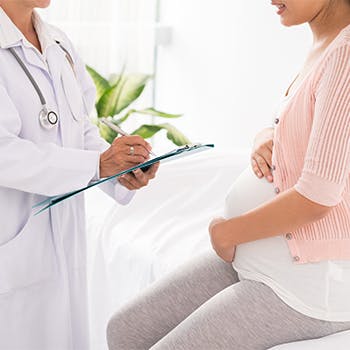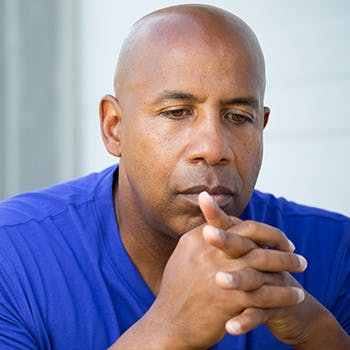Does Childbirth Cause Hemorrhoids?

If you’re suffering from hemorrhoids after giving birth, you’re not alone. In fact, hemorrhoids during and after pregnancy are very common, with 30-40% of pregnant people experiencing them.1 The good news is that most hemorrhoids are easy to treat at home and may even go away on their own after you’ve delivered your baby.1 Learn why childbirth causes hemorrhoids and how to manage hemorrhoid discomfort with these tips and the right products.
What Are Hemorrhoids?
Hemorrhoids are swollen veins on your anus or inside of your rectum—the section of your large intestine that leads to the anus. They develop due to an excess of pressure on your pelvis and bowels. When the pressure starts to become too much, the veins in your anus can absorb the impact and start to swell, causing hemorrhoids.1 Pregnancy causes an additional amount of strain in those areas, which leads to an increased risk of developing hemorrhoids.
Symptoms for Hemorrhoids
Symptoms of hemorrhoids from pregnancy or birth can include:1,2
• Pain during a bowel movement
• Itching, burning and pain around the anus
• Blood in your stool or on your toilet paper after you wipe, usually from an internal hemorrhoid
The Different Types of Hemorrhoids
There are two different types of hemorrhoids:
• Internal hemorrhoids: hemorrhoids located inside your rectum that aren’t visible from the outside
• External hemorrhoids: hemorrhoids located on or around the anus that can sometimes be seen from the outside
How Common Are Hemorrhoids from Childbirth?
Hemorrhoids during pregnancy and after giving birth are extremely common, especially during your third trimester and up to one month after delivery. An estimated 30-40% of people have hemorrhoids during their pregnancy, and the likelihood of developing hemorrhoids increases once you become pregnant.1
What Causes Hemorrhoids During Pregnancy and Birth?
Both pregnancy and a vaginal delivery increases a person’s risk of developing hemorrhoids due to things like hormonal changes and intra-abdominal wall pressure.2 In addition, constipation during pregnancy, straining during bowel movements and delivery, instrumental delivery and delivering a heavy newborn are also associated with an increased risk or hemorrhoids.3 Other factors can include:1
• The fetus: A fetus puts additional pressure on your pelvis and bowels as it grows. The weight from the fetus presses on the veins in your bowels, making it harder for them to pass blood through your body. As a result, the slower blood causes the veins in your anus to swell and turn into hemorrhoids.
• Increased blood in your body: Your body creates additional blood during pregnancy to support you and your baby. This causes additional strain on your veins as they’re forced to circulate more blood, leading to hemorrhoids.
• Constipation: A lot of pregnant women suffer from constipation due to fluctuating hormone levels and slower digestion. As a result, the extra weight from your stool and the excess straining from going to the bathroom puts additional pressure on the veins in your anus, causing hemorrhoids.
How to Treat Hemorrhoids from Pregnancy and Birth
Hemorrhoids from pregnancy or delivery can cause some serious discomfort. Find relief with these tips and some simple lifestyle changes.4
• Soak in warm water or take a warm bath three to four times a day to help shrink the hemorrhoids.
• When sitting down, use a pillow or waffle cushion to relieve the pressure on your butt. Try sitting in a reclining chair or a rocking chair instead of a regular, upright chair.
• Increase your daily fiber and fluid intake to prevent constipation and loosen your bowel movements. Take gentle stool softeners if needed.
• Use over-the-counter medications and products that soothe the area, like Preparation H’s Medicated Wipes for Women with chamomile, aloe and cucumber.
• Contact your healthcare provider if your hemorrhoids don’t improve.
When to See Your Doctor
In general, hemorrhoid discomfort can be treated at home. For most people, hemorrhoids will resolve themselves after giving birth, but a few cases require more intense treatment or surgical intervention.2 Reach out to your healthcare provider if you experience bleeding during a bowel movement or if your hemorrhoids don’t improve after treating them at home. While hemorrhoids can cause rectal bleeding, don’t assume that all rectal bleeding is caused by hemorrhoids, especially if your bowel habits change or if your stools change in consistency or color.5
Hemorrhoids During Labor
If you develop hemorrhoids during your pregnancy, they may get worse during labor and delivery due to the additional straining and pressure on your bowels. However, your hemorrhoids should improve within a few weeks with at-home treatments.1
If you’re suffering from hemorrhoids during pregnancy, Preparation H has products and articles that can help you find relief. Learn more about postpartum hemorrhoids on our Butt Hub or take our product quiz to see which preparation H line is for you.



